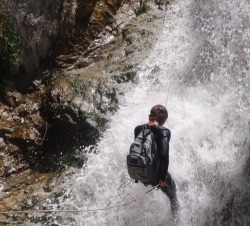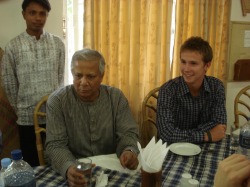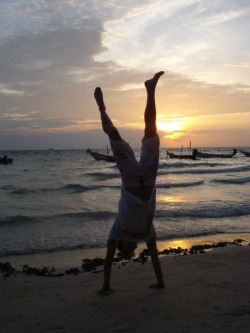A personal reflection written win my journal on Day 45
Just because I know the other world (The West) and have experienced it, does that make this world harder for me than for the people living here? What are their daily thoughts and aspirations? Everyone here, Anthony, Victor and Rosa included, always seem to be smiling and content; But I feel they must strive to progress, to better their lives, and attain comforts in the same way that I do. I feel like we often use the excuse that ignorance is bliss when referring to poverty. They don’t know what life in America is like so have nothing to compare the difficulties of their life to. While this might be true in some cases, I’m believing less and less that this excuse holds water. And even if they don’t know exactly how life in America could be, does that give this excuse any more legitimacy? Anthony and Augustine work in Panajachel, surrounded by consumerism and western culture on every corner. Even Chino and the kids watch TV at Dona Marias or Anacelis, where they are blasted with images of a world far apart from their own. Technology and Globalization have made knowledge widespread on an unforeseeable scale. Even as I sit here in the internet cafe copying this blog, the kids in this rural Mayan town are crowded around the computer next to me stealing cars and accepting missions on their cell phones playing Grand Theft Auto: San Andreas. The desire to progress and to provide happiness for your loved ones is human nature, and exists no less amongst poorer families than it does amongst the better off, both here and in the US.
In these terms, the great divide between us and them, the west and the rest, is not as vast as is suggested in my development economics books. Yes the income gaps are paramount, but we should not forget that the humanity we share in common is overarching. Yesterday, I spent the afternoon hanging out with Anthony and his friends, telling stories of “the good old days” and poking fun at each other. While forced to take on an air of responsibility to look after their families, Anthony and his buddies are still just guys in their early 20s, not so different from me and the boys.
The conversations turn difficult for me when they begin asking about life in the United States, how much it costs to get there and if they would be able to find a job. What do I tell them? While half of my heart wants to tell them to stay here with their families because they live such a beautiful and uncorrupted lifestyle, my second half wants to help them progress in any way I can, to encourage them to follow their dreams and seek a better future.
Would Anthony really have a better life if he came to the US though? Here, he is a respected member of the community with friends and family abound and a stable job. If he tries to leave, not only is the route by Coyote expensive, but it’s a treacherous 10-15 day long journey to a foreign land where he would be isolated by the language and lack of family. In the end, the decision is obviously not up to me, but my thoughts about bridging the divide between these two worlds are ever increasing, one shared smile, laugh, and conversation at a time.
I wanted to take the chance to update and reflect on some smaller aspects of our adventure so far.
- First thing I noticed recently was that we still have not completely filled up a single trash bag. I didnt even think about it until recently how little waste we have managed to produce in the past month and a half. At home, I feel like I take out the trash every other day. I obviously knew that we in the US produced an absurd amount of waste/trash, but I was surprised by how little we have produced here when not buying individualized and packaged goods. I also dont know what to do with our trash bag if we do fill it up. Upon initial observation, it seems as if most of it ends up plastering the river bed or crop fields.
- It rains here every single day without fail. In one second, we will sitting on the hillside enjoying the sun, and within a minute, we will be enveloped by the cloud and disappear for the rest of the afternoon. Given our position high up in the mountains, it feels like we are in Avatar, floating in midair.
- The weather is perfect for our radishes though! So we seem to have actually been able to grow a successfull harvest of radishes. After cleaning and separating them these past few weeks, they have sprouted! Its pretty sweet that they actually grew. For me, I know that this is the first time I have ever harvested crop. Within the next few days, we will be pulling them all, to eat and share with the community.
- I have pledged to myself that I will cook a big meal of rice, beans, lard, and home made corn tamalitoes for my family and any friends who like to join. After 5 hours of cooking over an open fire every day, cooking has become a new passion of mine that I hope to keep pursuing when I get back. The existence of a stove, oven, and microwave might throw me off a bit though. Let me know if you would like to join and I will cook more!
- I have little battles with my mind everyday over when to eat my banana or finish off my rice and beans from the night before. And it is always a tough call. I have written long journal entries, haha, about whether or not to eat the banana, why I need the banana, and how temporary the happiness from the banana really is; all the while staring at the succulent fruit in my hand. Is it easier to finish all my food at breakfast so that I can accept it is gone and stop thinking about it? Or is it better to save it, take small bites every hour, and drag it out throughout the day. Everyone of us has a different style in this regard.
- My shoulders and my butt bone are both bruised from sitting and sleeping.
- I consider going to bed at 9 pm a late night
- Sean still has not once been able to use his contacts because his fingers are so dirty.
- I have only washed my clothes one time, and that consisted of running water over them
- Chino noticed my flea bites and commented on them. I asked if he has ever had fleas. He said "Si claro, todo tienen pulgas". Or in English, Yes, of course, everyone here has fleas.
- When you feel anxious, try to take a few minutes to simply breathe, long deep breaths through your stomach. While you may think you dont have 5 minutes to waste, it might prove invaluable to your tranquility and happiness for the day.
As some of you already know, I love quotes, and this is one that I have been pondering and forming in light of this 8 week experience.
"Your life does not progress linearly, but is rather a perpetual cycle of breaking yourself down and building yourself back up."
http://www.youtube.com/watch?v=Yrx80mw2UQo
When you observe a gardener or a hotel maid working, what thoughts cross your mind? Do you feel bad that they don’t have a better job? Or do you respect them for doing what needs to be done to pay the bills? Has the thought about how fortunate they are for having a job in the formal sector that pays them a stable and reliable income ever come to mind? Until yesterday, I know that I had never had that thought before. We spent the day shadowing the heads of two of our diary families, Anthony and Augustin, as they went about a typical day of work.
We left with Augustin at around 7 AM, beginning the hour and a half walk down the mountainside to the town of Panajachel where he works as a gardener. While stunningly beautiful, the walk was challenging, steep, and frequented by barely passable mud-slid sections. We discussed Augustine’s past as we walked, learning even more about his troubled past and hardships. In passing, he motioned towards a black cross on the hillside, belonging to his sister who was shot three times, once in the stomach and twice in the head, while walking this same path to work 4 years before. He explained that she had owned a store in town so the criminal had anticipated her having some money on her. The police never followed up and the culprit still lives undisturbed in the town nearby. He turned and continued to walk down the mountain, leaving us wide-eyed in disbelief. After some silent walking, we ask him a question about when he first started to work. At 12 years old he said, his father passed away from a snake bite, leaving him with more responsibility to bring in income for his family. Without ever attending a day of school, he left for the coast to find work on the Fincas or cotton plantations, the conditions of which were disturbing in nature. Working an average of 9 hours, he would make only 1 centavo (one eight-hundredth of a dollar) a day for his efforts. (This was in the past so must adjust for currency appreciation) Moreover, his daily sustenance consisted of three tortillas, one for every meal; an amount that doesn’t even seem possible to me. Until he was 27 years old, he remained at the plantation, bringing back what little he could to his mother once a month. I was not even intending to write about this history, but it left me stunned and triggered such a deep sadness for my friends past struggle that I wanted to share the story.
Reminding me of a movie set, we eventually arrived at a gated community in which Augustine gardens for a wage of 1,200 Quetzales a month. Although not a large wage, the job is secure, pays reliably and helps ease the stressful challenges of money management for his family. As we said our goodbyes to go visit Anthony working at his hotel, Augustine commented on how fortunate Anthony was to have a job as a hotel cleaner. My perspective was thrown upside-down. I had never before considered a job as a gardener or hotel cleaner one to be strived for, but comparatively in their communities, these jobs have allowed Augustin and Anthony to ease the struggles of poverty for their families. We spent the afternoon getting footage of Anthony cleaning room after room and making bed after bed in a hotel that charges 50 dollars (400 Quetzales) a night to stay at.
While Augustine and Anthony are fortunate to have the stable jobs that they do, they spend every day tending to the wants and desires of their wealthier patrons in a tourist town full of luxury beyond their means. For me, it was a personal struggle to see the plates of uneaten food in the restaurants, the lavish beds in the hotels, and the smells and sounds of consumerism all around. As we walked past the nicest hotel on the main strip, we overheard a couple saying “That was the worst cheeseburger I have ever eaten, and the fish was hardly edible.” It awakened and doubled my desires for meat and seafood and western comforts, but all I could do was listen and watch. Next time I am travelling, and a guest in someone else country, I will try to be more aware and respectful of my actions and appearance. Although seemingly insignificant, the simple act of being aware of my consumption may lessen the struggle of others like Augustine and Anthony who are forced to observe our habits day in and day out before making the long walk back home.
Every interview, conversation, and observation opens up new doors to be explored in our research. While the first few weeks were personally eye-opening and interesting, we were only able to scratch the surface of the financial lives of our neighbors. The growth of our friendships and trust within the community have now allowed us to identify the complex and intricate nature of their lives and the important ways in which financial services factor in, both in the short and long-term. I wanted to take the opportunity to explain in more detail what the financial diaries we are constructing consist of. Using the in-depth Financial Diaries from www.financialdiaries.com as our model, our initial questionnaire, out of 3, asks questions regarding family size, ages, educational attainment, living standards (dirt floor, stove?, etc), food habits (how often they have enough food) large events (emergencies or weddings, etc) and physical asset ownership to begin to paint a picture of how the family is organized and roughly their socio-economic status. The questionnaire is simpler and less intrusive than the rest, designed to make the interviewee more comfortable. We have also been using the initial questionnaire to highlight certain aspects of each household that we find particularly interesting and would like to explore deeper in further interviews. Our second round of questions is designed to build upon the trust from the first and delve farther into the inflows and outflows of capital within a household. To accomplish this, we begin by identifying all the sources of income. This process is long and complex, as we must continually dig to uncover all the sources of income, both formal and informal. We have to make sure to explore all non-employment income, such as grants from the government, retirement pensions, rental income, remittances, and dowries too, as they can alter a families economic status significantly. The process then involves identifying every formal, casual and self-employed source of income for all family members, including earnings; payment schedules, and taxes, so that we have a full picture of the family’s financial situation. The second questionnaire wraps up by identifying all household expenses, ranging from living expenses to educational to unexpected ones. While a little intense to accomplish in Spanish, these have been fascinating interviews so far. First of all, we have been stunned by the sheer poverty of our neighbors, caused in large part due to their fluctuating and unimaginably low incomes. In many cases, we have found incomes are patched together from several informal sources, such as day-laboring, selling eggs, or making cloth skirts, all of which are highly unreliable. Our third questionnaire deals with financial instruments used by the households. This one allows us to compile a summary of the different savings, lending, and borrowing methods that each household has implemented in the past. We have recently made several breakthroughs with our third questionnaire, as families have opened up to us more and divulged more details of their personal lives. As you might imagine, people are often hesitant to explain every detail about their money to a foreign stranger, so we have been very fortunate. These have been super interesting as they are the missing piece of the puzzle. Borrowing, lending and saving through friends, microfinance institutions, banks, asset accumulation, and savings clubs are proving to be the means by which the poor here survive. We are also finding that they employ an unexpected variety of these methods to meet both their short and long-term needs. Lastly, we are completing our portfolios by following the cash flows of a select number of interviewees, to see exactly how they manage money day in and day out for the rest of our time here. Sorry, but I’m not going to go too deep into our findings here as we are too excited to portray them to you all in our final documentary! But.. I wanted to explain what we are compiling. While we wanted to better understand this reality by living as close as we can to it, our story and research is about this community. The stories we are uncovering are inspiring me more everyday and providing the drive I need to keep going. The days seem to flying by and part of me wishes we had another month or two to keep learning. Our daily conversations are becoming more productive too, targeted at crafting our final product and discussing a variety of partial solutions to give back to this community. I hope that our documentary can instill a passion and inspiration in all its viewers to give back by any means possible, no matter the scale.
I wake up, laying half on a pad and half on my backpack, disoriented and uncertain of where I am. I blink slowly. Ugh. My stomach adjusts itself and passes gas, indignant that I refuse to wake up and go to the bathroom again. I gently push a finger into my stomach but its so bloated it does not give at all. I roll onto my right side and close my eyes again. Maybe a minute passes, maybe 30, but who knows, there is no clock. My eyes open to the darkness again. Shit this hurts. I sit up. The pressure on my bladder is unbearable. I stand up and grope my way along the wall in search of the door. It’s torrentially down pouring. I cautiously pee from our doorway, plagued by a fear of an accidental solid emergency. I stare blankly at the dirt, trying to pass gas and relieve my stomach pressure. A half a foot long rat scurries across my vision and I take a step backward into the house. I continue to stand, observing and inhaling the rain, mesmerized by its persistence and the sounds of its fury on our tin roof.
What time is it I wonder to myself? I tread carefully back to our bed, fluff my sweatshirt pillow, and meticulously steal some blanket back from Sean. I drift in and out of sleep for who knows how long. My eyes open again. I repeat my earlier routine, and relieve the pressure on my bladder for the 4th time out of 6 that night. Reluctantly, I make the trek up the hill to the outhouse at our neighbor’s house. The dogs erupt in a frantic shouting match, disturbed by my unexpected presence. In vain, I try to silence them.
A mere 5 feet from the outhouse, I too am confronted with the unexpected. In the middle of the path, an old man sits crouched, pooping. Weird I think to myself. But I wait; we exchange a nod in passing and I continue my search for the outhouse. No moon and no stars complicate my predicament. I sit. I think. Friends, porcelain toilets and soft fluffy dogs flash across my mind. 15 minutes later I reemerge. I stand at the top of the hill, overlooking the distant flashes of lightning. I smirk and shake my head. This is absurd I say aloud to myself, and chuckle quietly.
I walk slowly home, force open the creaky door, and stand in the darkness; only the faint noises of the disgruntled dogs are audible over the sounds of rushing water. I hope it’s almost morning I think dejectedly. I repeat my earlier routine and settle back into bed. Its dark, I can´t read. What should I do? I drift off. My eyes open. I stand. I pee. I return. What is wrong with me I silently wonder? I stare at the ceiling and smirk again. At least I’m not hungry I think.
Then it happens. First a little hesitant and nervous about being first, but undeniably the noise I have been waiting for all night. But was it a mistake? No, I hear another call up the hill, and another, bolstered by an orchestra of dogs that add their barks. The roosters were crowing and soon I could wake up and begin my 29th day in Guatemala.
“Question: have you found that the percentage of your worries that are "real" have changed since the start of your trip? I guess that could sound like a cynical question, but it's not meant to be. What I mean is this: I find I waste a stupid amount of my time worrying about non-material things (which I suppose I would define as meaningless things, vain things or things that I have no ability to change--or perhaps, wouldn't even want to change if I could). For instance, I worry about some stupid conversation I had with a friend or about whether Anjie is going to like the movie that I'm making her watch or whatever. Obviously you're not watching movies, but I've often wondered if my/our worrying is a product of the fact that we have nothing "real" to worry about or if it's just part of who we are and we'd do it no matter what?
Do you worry about the stupid stuff at $1/day as much as you do at $20 or $50 a day? And if not, do you prefer worrying about the stupid stuff or the real stuff? (And if the real stuff, then can I have your car?)”
Hmm, good question from the dumb… The first thing that came to my mind when I read this was the overwhelming dominance that lacking a simple necessity has on one´s mind and thoughts. When you are hungry or tired, every thought or decision you have or make is done with respect to this “real” concern. In that way, the percentage of concerns that I would consider “real” or important has increased. We worry significantly about pulling a high enough number (make enough money) by market day so that we can feed us all for the week, or to pay off our Microfinance loan, cook dinner for our neighbors family, or save for an emergency.
Given my inability to separate my thoughts from connecting to hunger or body pain, its true that I have far fewer insignificant concerns. I think it is important first to recognize where our concerns originate though. I am going to make the claim that our concerns stem from our minds natural response to continually desire more. I think that our ¨concerns¨ over whether or not our girlfriends like the movie we put on is out of a desire to make sure that they are as happy as they could be. For you, that is a relative desire, because you already know that she has enough to eat and a bed to sleep in and is generally doing well. And while I don’t have a TV, here I worry far less about the little things, such as a conversation, or how I look, or smell, but it does not mean I don’t think about stupid things. I would consider the fact that I draw pictures of delicious steaks and think about how excited I am to play tennis when I get back, insignificant in my situation. As long as I have food to eat, I should be appreciative. And while my sleeping arrangement isn’t perfect, and consists of a shared blanket and a pad for my upper body, it could be worse; yet I think about how nice a bed or a pillow would be all the time.
I guess what I am getting at here is that I believe that it is a sadly natural response for our minds to fill their time with thoughts and concerns over our relative desires. While my desires here might be simpler and seem more ¨real¨ than my desires in the US, I still get frustrated at myself for always wanting more, or what I don’t have.
What is incredible about an experience like this though is the perspective that one can gain and apply to their life in the US. When I get back and find myself worrying about an awkward conversation I had with a friend, I hope to be able to harness my mindset here and put it in perspective. Because that conversation doesn´t matter when a billion people continue to go to bed hungry at night. And while I can´t relate exactly to the struggle of poverty because my time here is finite, I am hoping to be able to apply the knowledge I have gained to look past the bullshit that plagues our minds in the western world and apply my mind to more productive endeavors. And with a bit of luck, maybe I can provide an outlet, through video and blogs, for someone else, who didn’t have this amazing opportunity to live in Guatemala, to gain and learn as well.
The mood swings are so extreme, from euphoria and satisfaction at living the simple life, to a selfish and overwhelming desire to be back to my cushy life in the US. Thankfully though, several weeks into the project, a routine and excitement for the project are winning the mental battle. Every open air ride into town, stroll up the hill to check on our radishes, laugh shared with a little kid, or inspiring interview with a neighbor, fortifies my resolve and determination to take advantage of this opportunity. This is a once in a lifetime look into a different lifestyle that I am so fortunate to have in my lap right now.
My time here is finite, and while it may be hard sometimes, it will end and I will return to steaks, beds, and family. I should never complain, as this, and all struggles are relative. While impossibly more trying than life in Connecticut, we still cannot replicate the continual struggle of poverty or truly demonstrate the difficulties that plague our neighbors for a lifetime. For Anthony, Carlos, Chino and our new friends in Pena Blanca, this is no 8 week experiment, but life; and a life that contains no safety blankets of trust funds or finite timeframe. We will continue to try our best to gain glimpses into aspects of extreme poverty, and shed light on it through reflective and comedic video blogs, but the fact that a billion people live like this makes my insides burn with sadness and my mind swirl with methods to end it.
Why can we not create more businesses in the western world that create products or services that provide benefits to this world? I´m not saying that capitalism or making money is wrong, but rather that we have proven ourselves innovative enough to design businesses that help the poor. This is far from a new concept, yet I never once heard ”the double bottom line” mentioned in my micro economics class last semester. In economics terms, you have an almost infinite market of more than 2 billion people that need services and products to rise out of poverty. And if social businesses become so successful that they tap the market, thank god. We will have proven that business can be a variable sum game, where both the west and the rest can benefit. There are a number of ways these social businesses can be designed and modeled, and a number of them already exist, Grameen Dannon, Tom´s Shoes, etc (Google it). The principle at the core though, as in any business idea, is to recognize a need and find a way to provide the service or product that addresses that need. Observe, be innovative, and take the challenge to make a sizeable living while actively pushing the boundaries of traditional business. Who knows, maybe the knowledge that you have the potential to help others will revive your tedious job with a fresh wave of inspiration. Please feel free to tear apart my arguments or build upon them. This is simply an overview of a complex subject, (written in a journal on a dirt floor), designed to provoke thought. Thanks.
Fun fact of the day: I wander around brushing my teeth for around 25 minutes a day minimum. It tastes so good and kinda makes me feel like I’m eating.
|
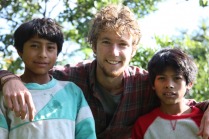
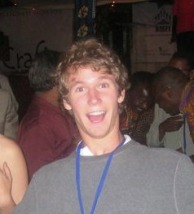
 RSS Feed
RSS Feed